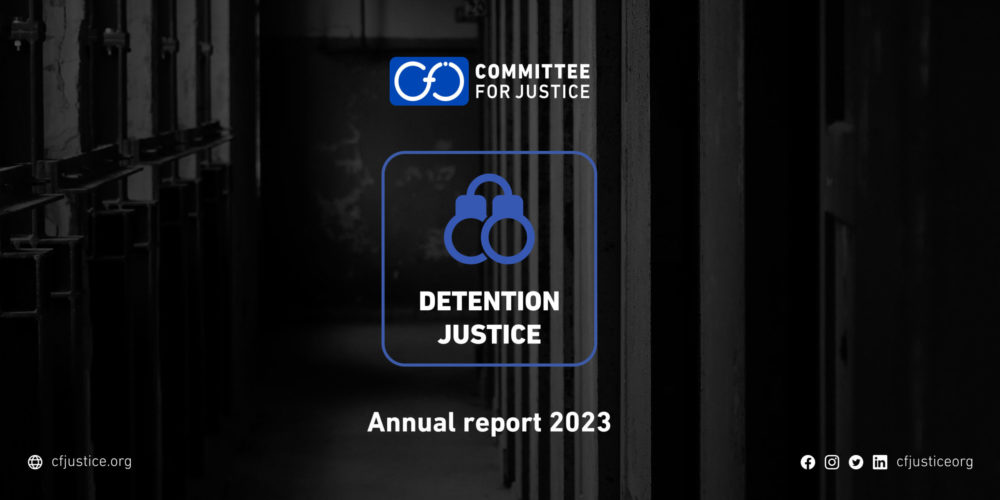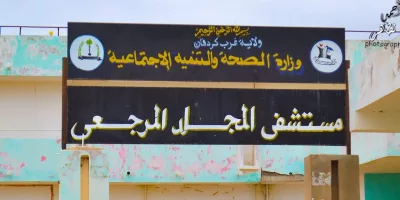The Committee for Justice (CFJ) said in its annual report that it documented 3,537 human rights violations against detainees in Egypt during 2023 within 49 detention centers.
The majority of these violations were related to arbitrary deprivation of liberty (about 90%), followed by enforced disappearances (174 violations) and 106 cases of poor detention conditions. The violations also included cases of torture and deaths within detention centers (36 violations for each).
On a regional level, CFJ documented violations in 17 Egyptian governorates, with Cairo topping the list with approximately 77% of the documented violations (2,729 violations), followed by Sharqia Governorate with nearly 16% (601 violations). Concerning types of detention centers, among 610 documented violations, police stations ranked first, accounting for about 48% of the total observed violations (294/610), the majority of which were related to arbitrary deprivation of liberty. Following closely were central and public prisons and penitentiaries, representing around 45% of the total with 277 documented violations, with the majority occurring within poor detention conditions in prisons (92 violations).
Regarding victim demographics, youth were the most affected by violations, with 131 documented violations, followed by middle-aged individuals with 126 violations, and seniors with 41 violations. Activists and members of political parties were the most targeted among the victims, with 36 documented violations. The State Security Prosecution was the primary judicial authority where accused individuals appeared, with victims presenting 2,675 documented violations during the year.
In terms of documenting violations, CFJ verified complaints and violations against 51 victims throughout the year, occurring in approximately 30 detention centers. The documented violations varied between enforced disappearances, torture, deliberate denial of healthcare, poor detention conditions, and physical assaults on prisoners in solitary confinement.
Simultaneously, alongside monitoring and documentation efforts, CFJ filed 55 complaints and correspondences, as well as attended meetings concerning victims and the human rights situation in Egypt. These communications were directed to various United Nations entities, including the Working Group on Arbitrary Detention, the Working Group on Enforced Disappearances, the Special Rapporteur on the Situation of Human Rights Defenders, the Special Rapporteur on Extrajudicial, Summary or Arbitrary Executions, the Special Rapporteur on the Promotion and Protection of Human Rights and Fundamental Freedoms While Countering Terrorism, the Special Rapporteur on Torture, and the Special Rapporteur on the Promotion and Protection of Human Rights in the Context of Countering Terrorism.
On the legislative side, the Egyptian Parliament issued 188 draft laws and ratified 51 international agreements, as reported by the State Information Service. Amendments were made to the Police Authority Law, empowering the Supreme Police Council to enforce security measures without disclosing reasons. Egyptian courts handed down death sentences in two cases: the “New Egypt Cell” case and the “Minya Terrorist Cell” case, known as Case No. 2103/2021 State Security Supreme Emergency and Case No. 115749/2022 Criminal Court of Second October and Case No. 335/2022 State Security Criminal Court, respectively.
Concerning the unjust judicial rulings targeting human rights defenders, the final verdict in the “Coordination Case” (Case No. 1/2021 Emergency State Security ) was issued by the First Terrorism Circuit of the State Security Criminal Court. Additionally, the military ruler endorsed the final verdict against activist Moaaz El-Sharqawi, sentencing him to 10 years in prison and five years of probation after completing the sentence. This verdict was related to the case in which the former presidential candidate, Abdel Moneim Aboul Fotouh, and others were accused of similar charges.
CFJ also documented 15 decisions to include individuals on Egypt’s terrorism lists during the year, while only two decisions were made to remove individuals from these lists. The total number of victims affected by inclusion or arbitrary extension on terrorism lists reached approximately 2,429 people, including the names of deceased individuals such as former President Mohamed Morsi and the Islamic scholar Youssef al-Qaradawi.
The United Nations Human Rights Committee reviewed Egypt’s file at the beginning of the year, and at the end of the year, the UN Committee Against Torture held its periodic review of Egypt’s record on torture crimes. Furthermore, the subcommittee on accreditation of the Global Alliance of National Human Rights Institutions postponed the consideration of the Egyptian National Council for Human Rights’ request for reaccreditation as a category “A” institution for 12 months.
In 2023, Reporters Without Borders published a statement on the 10th anniversary of the events of June 30, 2013, describing the situation as the “worst ten years for press freedom in Egypt.” These years witnessed the imprisonment of at least 170 journalists, arbitrary arrests of dozens, blocking of around 500 news websites, the killing of six journalists, and the continuous enactment of laws restricting journalists’ safety and freedom of the press.
Recommendations
At the conclusion of its report, CFJ recommended that the Egyptian authorities open the Rafah border crossing for the passage of the wounded and humanitarian cases from the Gaza Strip, and urgently allow the entry of humanitarian aid.
CFJ also urged Egypt to conduct an independent and transparent investigation into the violations and irregularities that marred the presidential elections. It called for the release of members of the Tantawi campaign, the release of prisoners of conscience, and the release of those who have exceeded two years in pretrial detention without trial or investigation based on condemning evidence. Furthermore, CFJ called for allowing local and international civil society organizations to organize regular visits to monitor conditions inside detention centers.
CFJ called for the suspension of the implementation of unjust verdicts issued during the year, retrial of the accused before a regular judge, halting judgments from exceptional courts (terrorist court, state security, and military courts), and ceasing the targeting of the Egyptian civil society and human rights defenders. It also emphasized the need to stop their imprisonment without just cause and to implement the recommendations outlined in the final report on Egypt issued by the United Nations Human Rights Council.
Additionally, CFJ called for a thorough investigation into the crimes of torture, enforced disappearances, and deliberate denial of healthcare against the victims documented in the report. It emphasized the activation of the prosecutor’s oversight role in all detention centers, cessation of security dealing with the files of those held in pretrial detention and those detained on charges related to political cases. CFJ urged compliance with international humanitarian standards and laws in dealing with detainees overall and called for a reassessment of the conditions of detainees, especially at the Reform and Rehabilitation Center in Badr City (Badr Prisons Complex). Furthermore, it called for improving the dire conditions related to their detention and trial in fair conditions for their defense.






